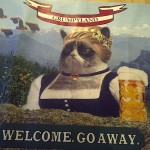Life and das Ding an sich: How are You Interpreting Your Life? As Eeyore or Beethoven?
“… you’re not getting paid for living a life, but transforming it, interpreting it and giving it meaning.”
– Jane Alison, author of The Love Artist, discussing historical fiction writing in coursera.org University of Virginia Historical Fiction course, Plagues, Witches and War
| Which is your world? | ||
 Grumpyland? |
OR |
 Happyland? |
Sometimes the most obvious truths are the most enlightening. But what Jane Alison said got me thinking.
Not just writers, but everyone, is not just living a life, but transforming it, interpreting and giving it meaning.
Maybe we can’t choose if it is sunny or rainy, but we do choose if this will influence our view of the morning.
“There are those who will wish you good morning. If it is a good morning, which I doubt.”
– Eeyore, A.A. Milne’s Winne-the-Pooh
And on a grander scale, we choose every single minute of our lives, what meaning we will give to life’s everyday challenges.
Will we think, “Oh, I’m a failure, because I haven’t got a brain,” like Scarecrow from the Wizard of Oz?
Or will we write one of history’s most moving musical pieces at a time when we are almost completely deaf, like Beethoven? In fact, when the 9th premiered in Vienna on May 7, 1824, the composer could not hear the enthusiastic applause of the strict Viennese audience and remained turned toward the stage until a singer went to where he was sitting and had him turn to bathe in their adoration.
So what meaning are you giving your life?
Are you the born loser? Like Charlie Brown who sometimes lies awake at night and asks, “Where have I gone wrong?” Only to have the voice inside his head answer, “This is going to take more than one night.”
Or are you Ned Flanders? A person who exudes so much contentment with life that everyone, and especially Homer Simpson, automatically assumes he has a charmed existence.
There is no objective reality in this world.
Every action, reaction, and experience is subject to interpretation. Like the German philosopher, Immanuel Kant, argues in his Critique of Pure Reason “things in themselves” (das Ding an sich) are unknowable. We interpret our experiences. A passive knowledge or observation does not exist.
When the times are a-changin and the waters are grown and you’re drenched to the bone, are you gonna start swimmin’ or sink like a stone?
And afterwards, will you look back and say, “I learned how to swim because of that” or “Woe is me. Who wouldn’t end up a drenched miserable rat with all that water”?
Up to you.
Transformation, interpretation, meaning.
We are all transcribing our life experiences, not on paper but in our own self-perceptions.
To my fellow writers, struggling to get published or write the next best seller, I think we have to remind ourselves that we decide how we handle our setbacks. We can write our best possible book but in the end, we ultimately can’t control if an agent or publisher is interested. We can’t influence the particular tastes and preconceived notions of particular readers. But we can decide how we will interpret the long waits, countless rejection letters or critical reviews.
Will they strengthen or break us?
If only Charlie Brown, Eeyore and the Scarecrow had taken the following advice:
“Give it all and ask for no return
And very soon you’ll see and you’ll begin to learn
That it’s alright, it’s alright”
– It’s Alright, Guns N Roses



